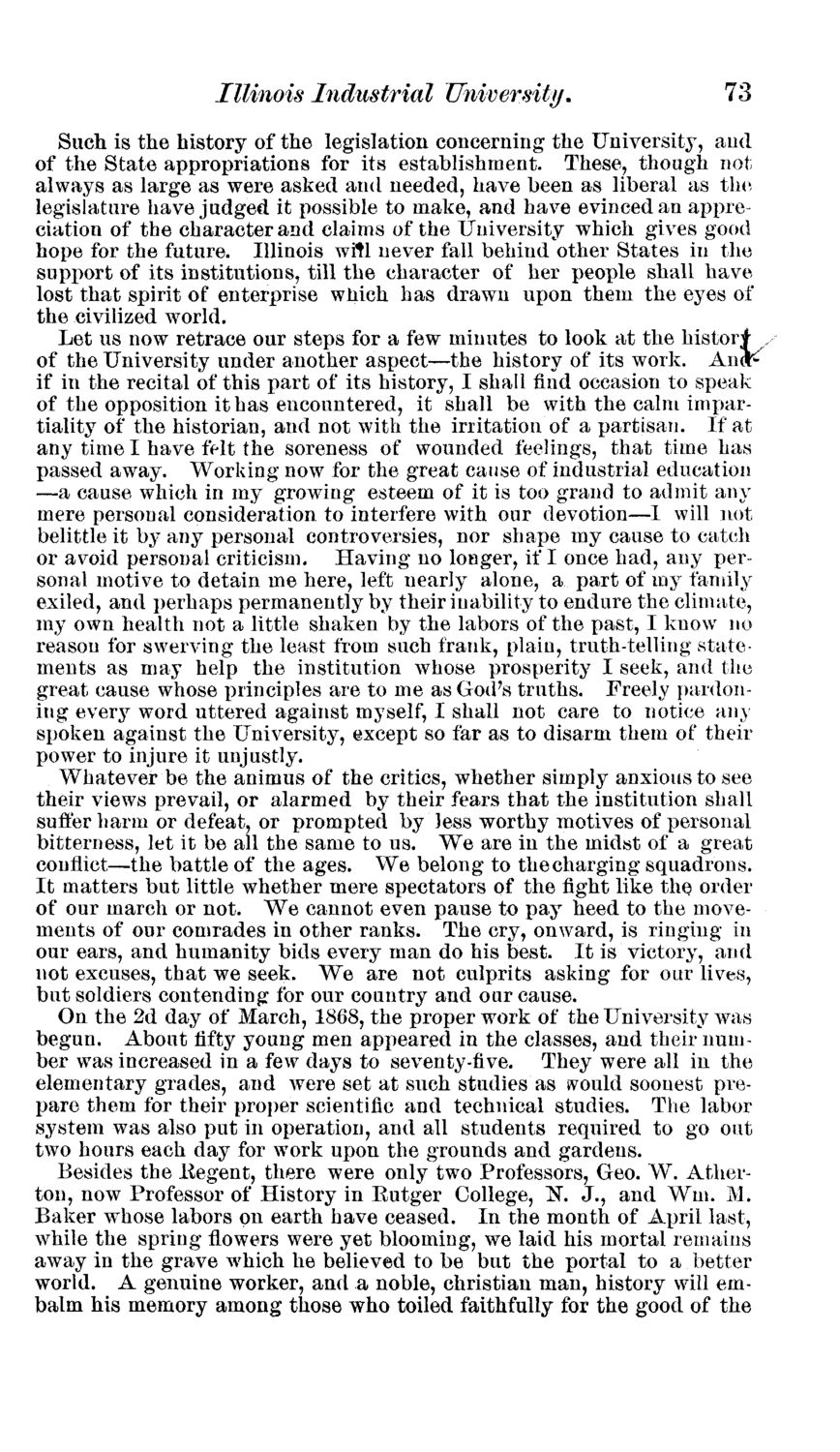| |
| |
Caption: Board of Trustees Minutes - 1874
This is a reduced-resolution page image for fast online browsing.

EXTRACTED TEXT FROM PAGE:
Illinois Industrial University. 73 Such is the history of the legislation concerning the University, and of the State appropriations for its establishment. These, though not always as large as were asked and needed, have been as liberal as the legislature have judged it possible to make, and have evinced an appreciation of the character and claims of the University which gives good hope for the future. Illinois wftl never fall behind other States in the support of its institutions, till the character of her people shall have lost that spirit of enterprise which has drawn upon them the eyes of the civilized world. Let us now retrace our steps for a few minutes to look at the histori of the University under another aspect—the history of its work. AndK if in the recital of this part of its history, I shall find occasion to speak of the opposition it has encountered, it shall be with the calm impartiality of the historian, and not with the irritation of a partisan. If at any time I have felt the soreness of wounded feelings, that time has passed away. Working now for the great cause of industrial education —a cause which in my growing esteem of it is too grand to admit any mere personal consideration to interfere with our devotion—1 will not belittle it by any personal controversies, nor shape my cause to catch or avoid personal criticism. Having no longer, if I once had, any personal motive to detain me here, left nearly alone, a part of my family exiled, and perhaps permanently by their inability to endure the climate, my own health not a little shaken by the labors of the past, I know no reason for swerving the least from such frank, plain, truth-telling statements as may help the institution whose prosperity I seek, and the great cause whose principles are to me as God's truths. Freely pardoning every word uttered against myself, I shall not care to notice any spoken against the University, except so far as to disarm them of their power to injure it unjustly. Whatever be the animus of the critics, whether simply anxious to see their views prevail, or alarmed by their fears that the institution shall suffer harm or defeat, or prompted by less worthy motives of personal bitterness, let it be all the same to us. We are in the midst of a great conflict—the battle of the ages. We belong to the charging squadrons. It matters but little whether mere spectators of the fight like the order of our march or not. We cannot even pause to pay heed to the movements of our comrades in other ranks. The cry, onward, is ringing in our ears, and humanity bids every man do his best. It is victory, and not excuses, that we seek. We are not culprits asking for our lives, but soldiers contending for our country and our cause. On the 2d day of March, 1868, the proper work of the University was begun. About fifty young men appeared in the classes, and their number was increased in a few days to seventy-five. They were all in the elementary grades, and were set at such studies as would soonest prepare them for their proper scientific and technical studies. The labor system was also put in operation, and all students required to go out two hours each day for work upon the grounds and gardens. Besides the liegent, there were only two Professors, Geo. W. Atherton, now Professor of History in Eutger College, N. J., and Wm. M. Baker whose labors on earth have ceased. In the month of April last, while the spring flowers were yet blooming, we laid his mortal remains away in the grave which he believed to be but the portal to a better world. A genuine worker, and a noble, christian man, history will embalm his memory among those who toiled faithfully for the good of the
| |